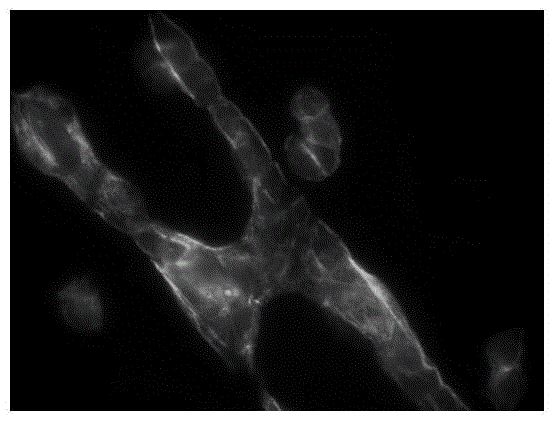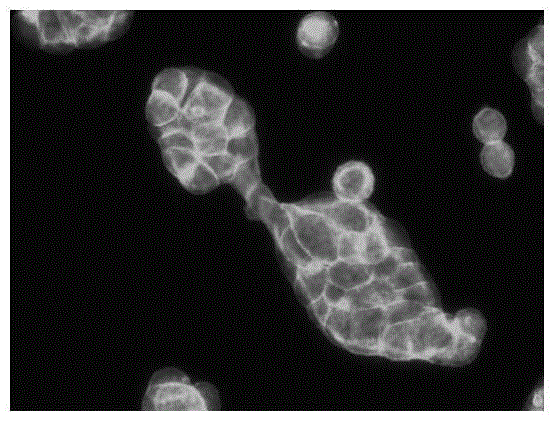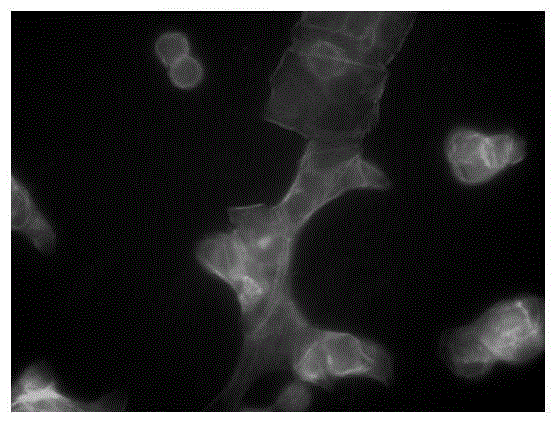Application of diclofenac sodium to preparation of medicine for inhibiting tumor cell metastasis and spreading
A technology of diclofenac sodium and tumor cells, applied in the pharmaceutical field of diclofenac sodium, can solve the problems such as the pharmacological effects of diclofenac sodium have not been found, and achieve the effects of reducing the number of deaths, large blocking effect, and shortening the research and development cycle.
- Summary
- Abstract
- Description
- Claims
- Application Information
AI Technical Summary
Problems solved by technology
Method used
Image
Examples
Embodiment 1
[0029] Example 1: Application of diclofenac sodium in the preparation of a drug for inhibiting the metastasis and spread of colon cancer cells. The specific experimental plan is as follows:
[0030] 1. Experimental materials
[0031] Colon cancer cells (HT29) were used in the experimental stage of the present invention, and the drug used in the positive control was nocodazole (experimental concentration: 10uM). The negative control group received no treatment.
[0032] The experiment used diclofenac sodium compound C 14 h 10 Cl 2 NNaO 2 , CAS NO. is 15307-79-6, the concentrations are 80uM, 60uM, 50uM, 40uM, 10uM.
[0033] 2. Experimental method
[0034] For colon cancer cells cultured for 24 hours (cell density: 10 5 ) for drug stimulation for 2 hours:
[0035] (1) Centrifuge the colon cancer cells in a better state in the culture dish, and add an appropriate amount of culture medium to make a cell suspension;
[0036] (2) Get the cell suspension count, according to ...
Embodiment 2
[0044] Example 2: Transwell cell migration assay was used to determine the effect of diclofenac sodium on the migration ability of colon cancer cells.
[0045] Will 1×10 5 The HT29 cells were inoculated in Transwell chambers with a 12.0 μm membrane at the bottom, and continued to be cultured. After the cells adhered to the wall, DMEM complete medium with different concentrations of diclofenac sodium was added to the upper chamber. To maintain osmotic pressure, 0.05%-0.2% BSA was added, and DMEM complete medium containing 15% FBS was added to the lower chamber to continue culturing for 24 hours. The unmigrated cells on the upper surface of the membrane were carefully wiped off with a cotton swab, and the cells that migrated to the lower surface of the membrane were fixed with 2% PFA at 37°C for 10 minutes and then stained with Giemsa. Ten visual fields were randomly selected under a high-power microscope to count the migrated cells.
[0046] Cell migration rate = [the average...
Embodiment 3
[0050] Example 3: The damage repair experiment detects the effect of diclofenac sodium on the migration ability of tumor cells.
[0051] Take HT29 cells in the logarithmic growth phase, and add 1×10 cells to each well of a 24-well plate5 After the cells grow into a single layer, draw a "one"-shaped scratch, rinse with PBS, add different concentrations of diclofenac sodium to the control group and the experimental group, and take pictures. After 22 hours of culture, take pictures again at the same site to measure the migration distance. The experiment was repeated 3 times, and the cell migration rate=[(0h average value of the experimental group-22h average value of the experimental group) / (0h average value of the blank control group-22h average value of the blank control group)]×100%.
[0052] Diclofenac sodium acts on LTEP and A549 cells for 22 hours at different concentrations (10-80 μg / ml) to inhibit migration. The results show that diclofenac sodium has a dose-dependent inhi...
PUM
 Login to View More
Login to View More Abstract
Description
Claims
Application Information
 Login to View More
Login to View More - Generate Ideas
- Intellectual Property
- Life Sciences
- Materials
- Tech Scout
- Unparalleled Data Quality
- Higher Quality Content
- 60% Fewer Hallucinations
Browse by: Latest US Patents, China's latest patents, Technical Efficacy Thesaurus, Application Domain, Technology Topic, Popular Technical Reports.
© 2025 PatSnap. All rights reserved.Legal|Privacy policy|Modern Slavery Act Transparency Statement|Sitemap|About US| Contact US: help@patsnap.com



